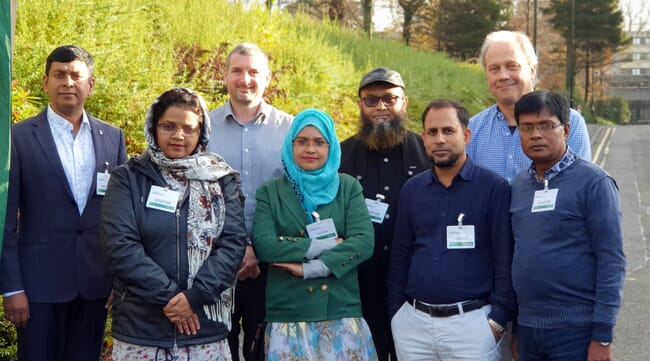Probiotics are microorganisms, mostly bacteria, that can provide health benefits to shrimp and fish when ingested or added to water. The interdisciplinary team, led by Stirling's Institute of Aquaculture (IoA) is launching the computer-based tool in Bangladesh as it is currently experiencing a growing demand for probiotics with the intensification in shrimp and fish farming. But the scientists believe a wider roll-out in the future could benefit other countries in a similar position. A delegation from the southern Asian country is currently visiting the university to finalise the initial launch of the tool.

The Pedigreeproject aims to bring research from a previous study, IMAQulate, into practical use. Both projects are funded by the Biotechnology and Biological Sciences Research Council.
Principal Investigator Dr Francis Murray said: “There are an estimated 250,000, mostly small-scale, shrimp farmers in Bangladesh. Some of these farmers and hatchery owners are starting to use probiotics as prophylactics to prevent disease outbreaks and manage water quality.
“Due to the recent intensification of shrimp farming, most of the probiotics used by Bangladeshi farmers are imported from India and around the world. As probiotics fall outwith the definition of drugs, they are in a regulatory grey area. Consequentially, production practices and product quality is highly variable – with many products of limited effectiveness applied under equally variable farming conditions. Our research also identifies potential risks to the environment and shrimp farm workers, and the marketing of these products as benign may be misleading.
“The tool uses a variety of indicators to differentiate riskier from higher-quality products, informing farmers and allowing regulators to focus limited resources where most needed. The indicators – based upon product label information and web research – were selected for their correlation with a range of risk factors, identified during laboratory analysis of product samples from Bangladesh and India.”
In the absence of effective commercial vaccines, disease management is a fundamental challenge for shrimp farmers – with a recent pandemic caused by bacterial pathogens. While antibiotics are typically used to treat the disease, alternative prophylactic methods – such as probiotics – aim to prevent disease and keep shrimps healthy. As probiotics can reduce the requirement for antibiotics, the preventative approach also helps to tackle antibiotic resistance.
The tool operates on a ‘traffic-light system’ that indicates where products feature on the scale of expected efficacy and safety, with a green light given to better quality products. The Stirling team hope their tool will facilitate the introduction of minimum standards for quality assurance and allow importers and distributors to self-regulate. A key partner in this work is the Bangladesh Aqua Products Companies Association, which represents major probiotic importer-distributors in the country.
Dr Murray is supported by Co-Investigators Dr Andrew Desbois, also of the IoA; Dr Muhammad Meezanur Rahman, of the WorldFish Centre; Dr Mohammad Mahfujul Haque, of Bangladesh Agricultural University; and Dr Faruk Ul Islam of Practical Action, Dhaka. Both Dr Haque and Dr Islam are IoA alumni.
Dr Desbois said: “Consumers in the UK buy their shrimps from India and Bangladesh – and we want to ensure that, in doing so, we are not putting workers’ health at risk.
“We believe our tool will play a key role in delivering safe, effective aquaculture probiotic products in Bangladesh and further afield – as well as helping to mitigate the global threat of antibiotic resistance. Its successful implementation will be delivered through partnerships with key stakeholders, including the Government of Bangladesh, regulators and non-governmental organisations representing farmers’ interests.”
Pedigree follows the IoA’s Sustaining Ethical Aquaculture Trade (2009-13) and IMAQulate projects (2006-19). The projects have worked with 400 shrimp and fish farmers in Bangladesh, 212 in India and 200 in Kenya, as well as manufacturers and distributors of aquatic health products.
Earlier this month it was announced that the IoA will receive the UK’s most prestigious academic honour – the Queen’s Anniversary Prize. The award recognises the Institute’s pioneering work in aquaculture – the world’s fastest-growing food production sector – in a bid to tackle global hunger.
Professor Neville Wylie, Deputy Principal (Internationalisation) at the University of Stirling, said: “The Institute of Aquaculture has a longstanding, collaborative relationship with Bangladesh – strengthened by the fact that many of our alumni are working in the country’s aquaculture sector.
“Our scientists have helped build capacity, expertise and resilience in Bangladesh in recent decades. Pedigree is the result of more than 10 years of work and it will help to improve the effectiveness and safety of aquaculture probiotics in circulation in Bangladesh and elsewhere.
“This important, international study – which comes just days after the Institute was recognised with the Queen’s Anniversary Prize – is illustrative of the internationally-renowned research and teaching led by the Institute of Aquaculture, aimed at tackling global problems of food security, hunger and sustainability.”


